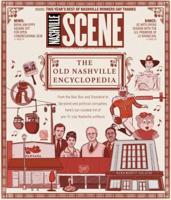For thinking globally and acting locally, Karl Meyer has been cited by the Metro Health Department.
Meyer, an aging radical who has launched protests against various appendages of authority ranging from the Internal Revenue Service to the American Embassy in Vietnam, has for years refused to regularly trim the high grass and weeds of his North Nashville home.
As a result, a health inspector wrote him up for violating the sanitation requirements of the Metro Code. Meyer—whose lush yard includes 2,000 tomatoes, 30 varieties of grapes, and 40 kinds of berries—will appeal the notice next week in General Sessions Court.
“You hear in the news about how Tennessee is going to lose federal money over the inability to keep up with clean air standards,” says Meyer, who lives with three other people in a sustainable living commune. “Well, the Health Department is constantly harassing people to cut their grass and vegetation which means dirty, gasoline-powered motors.”
He adds, “The important social issue is that we need to realize that we desperately need vegetation. We tell Brazil not to cut their rain forest, but the creation of oxygen through photosynthesis requires every blade of grass.”
Health Department spokesman Brian Todd says that under the ordinance, Metro can cite homeowners if their yards might attract rodents.
“You want to keep the rat population to a minimum and minimize the health risks to a community,” he says. “But tall grass attracts rodents by allowing them to hide from prey.
Meyer retorts that he has “a lot of snakes” lurking in his yard, so if there are rats scurrying about, they are quickly gobbled up. Told that Metro also considers snakes to be health risks, Meyer says he doubts there are poisonous vipers slithering in his yard. “Now if the Health Department found those snakes on my property and wanted me to get rid of them, that would be reasonable.”
In a typical year, the Health Department cites nearly 4,000 people for high grass and weeds. Nearly all of them agree to trim their yards. So what’s driving Meyer?
“This is not about property rights. I don’t believe in private property,” he says. “This is about leaving the land more viable than when I came to it. We have to start thinking differently about our relationship with vegetation for the sake of the planet.”




